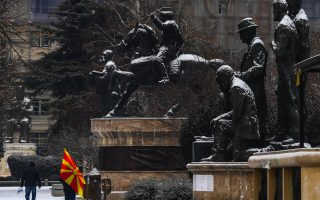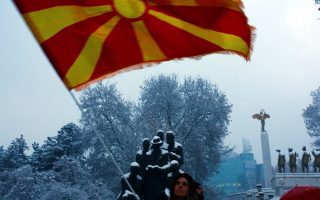Bartering our historical identity

It goes without saying that an issue as important as the name dispute between Greece and the Former Yugoslav Republic of Macedonia (FYROM) needs to be handled with great care, with the aim of maximizing the benefits of a resolution or at least of minimizing the damage – obviously within the best possible bounds.
Realism, as the only guarantee of viable solutions, also dictates the need for compromise. The scope, however, of any compromise can only be seen clearly once we understand what is at stake – in other words, what there is to lose. And on this particular issue, the toll is more than heavy: The so-called Prespes agreement and everything it entails is an affront to, or more precisely an assault on, Greece’s historical identity.
The past, the historical journey, is a fundamental element in the identity not just of a people, but of every person. On an individual level, the story of each person defines their uniqueness and personality and is therefore the cornerstone of their dignity.
Man, Karl Jaspers said, is a historical being that cannot be understood without his past. “No reality is more essential to our self-awareness than history… it shows us standards by which to measure the present,” the German-Swiss philosopher said. In a similar vein, French existentialist Jean-Paul Sartre argued that we are our past and our future selves, but without our past, we are not what we are. The past, therefore, is an intrinsic part of our identity. This is also why historicity is protected by law as an element of a nation’s and an individual’s identity.
Indeed, both international law and national legislation protect nations’ historic identities. One typical example is the fact that denial of the Holocaust and other genocides is a crime in most countries. So if someone denies that the extermination of the Jewish people took place, they will be – rightly – considered as having committed a crime. The reason why Holocaust denial is a crime is because it harms something much deeper: the collective, legally protected right of the historic identity of the Jewish nation. Denial of historical facts that casts doubt upon the historical identity of a nation is considered a particularly odious act.
It is, therefore, impossible to understand the concept of a people without their past, just as it is impossible to deprive an individual of his past, as the damage that is incurred with such identity theft is similar to moral and social death.
If we imagine for a moment that Greece is suddenly inhabited by another people who have no connection to the history of the Greeks, this new nation could not regard itself as Greek. A people is its history.
A nation’s history is instrumental to its self-awareness but also to how it defines its place in the community of nations. Erasing its history or slighting its historical memory can have devastating consequences on its existence and continuity. And when global public opinion is being shaped by and large in the uncontrollable space of the internet, where controlling the dissemination of erroneous information is almost if not entirely impossible, rather than at universities and schools, then historical identity becomes even more vulnerable. Not by chance, the saying is that there are two ways to most effectively bring about the disappearance of a people: erasing its language and giving away its history.
We should not be giving away our name with a mere signature.
Christos Mylonopoulos is a professor of law at the University of Athens.





